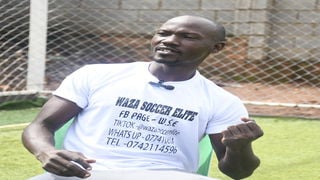
Former Uganda Cranes and Gor Mahia defender Godfrey Walusimbi during the interview with Nation Sport at Kyengera in Kampala on November 15, 2023.
| Samuel Gacharira | Nation Media GroupFootball
Premium
Godfrey Walusimbi: Xenophobia killed my PSL dream in South Africa
What you need to know:
- Walusimbi joined South African giants Kaizer Chiefs in August 2018 after a successful five-year stint with record Kenyan champions Gor Mahia
- Kaizer Chiefs approached Walusimbi on deadline day to move to Chippa United on loan to pave way for Akpeyi’s arrival but the Ugandan would hear none of it and insisted for a release
- Now 34, Walusimbi juggles his time between class and his football academy, Waza Soccer Elite, which was inspired by a failed trial at Swedish side BK Hacken back in June 2011
Over the years, the South African topflight, Premier Soccer League (PSL), has proved a tough hunting ground for many football players from the East African region.
A select few like Dennis Onyango of Uganda and Kenyans Musa Otieno and Brian Mandela have excelled in the PSL with their careers spanning more than a decade, but majority have struggled to make an impact.
So complex is playing in South Africa’s top tier league that Godfrey Walusimbi, Uganda’s most capped player, failed to leave a mark there.
Walusimbi joined South African giants Kaizer Chiefs in August 2018 after a successful five-year stint with record Kenyan champions Gor Mahia. The left-back signed a lucrative three-year deal after successful negotiations between both clubs unlocked a transfer stalemate.
“We had dominated Kenyan football for so long and I wanted a fresh challenge in my career. When Kaizer Chiefs approached me, I opted to activate my buyout clause since I still had a running contract with Gor Mahia. There was no bad blood between me and Gor Mahia’s management. It was just normal transfer business like it happens anywhere else in football,” said Walusimbi of the move that saw Gor get approximately Sh5 million in transfer fees.
Walusimbi had a bright start to life at Chiefs under Italian coach Giovanni Solinas, making his debut, a 90-minute appearance against Free State Stars, on September 18.
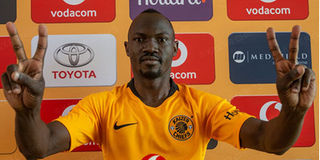
Uganda international Godfrey Walusimbi poses for photos during his unveiling as a Kaizer Chiefs player on August 30, 2018.
“The PSL is really a professional league from organisation, facilities and even the playing style. There was total increment in salary, accommodation was okay, the fans were many, the (Soweto) derby was like a national function…it was just a different level,” he explained.
The arrival of German coach Ernst Middendorp in December 2018 saw Walusimbi spiral down the pecking order at his new club. And on January 31, 2019, transfer deadline day, Kaizer Chiefs announced that they had parted ways with the 29-year-old defender.
“Kaizer Chiefs have parted ways with left-back Godfrey Walusimbi. The player has opted to go back home to Uganda. We would like to thank Godfrey for his contribution to Kaizer Chiefs and wish him all the best,” read a statement from the club.
Last-minute swap deal
But the Ugandan’s exit was not all rosy as the club’s statement suggests following grim revelations by Walusibi during an exclusive interview with Nation Sport in Kyengera, Kampala.
“Before that happened, they had put me in a situation whereby they showed me like I was less important to the club like for two to three games. That situation really hurt me but I kept on moving, because even journalists could ask me, ‘What happened? Are you injured?’
“As a player if you happen to be in the first eleven and games have been going on well or even losing convincingly, it’s surprising when the coach decides to put you out without talking to you. A good manager should inform you why he is making the changes but I was not told anything and it’s then that you start relating other things happening at the club to your situation,” Walusimbi broke down the turbulent times.
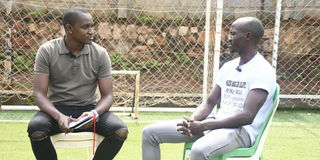
Former Uganda Cranes and Gor Mahia defender Godfrey Walusimbi (right) during the interview with Nation Sport's Samuel Gacharira at Kyengera in Kampala on November 15, 2023.
With first choice goalkeeper Itumeleng Khune injured, Chiefs were desperately in need of a custodian after Namibian Virgil Vries had failed to step up. They had identified Nigerian international Daniel Akpeyi as Khune’s replacement but their quota for foreign players was full. Therefore, they approached Walusimbi on deadline day to move to Chippa United on loan to pave way for Akpeyi’s arrival but the Ugandan would hear none of it and insisted for a release.
‘Hidden xenophobia’
“It was an unexpected decision from the club. They made the decision a few hours to the deadline and hadn’t informed me earlier. It wasn’t appropriate because when you want to loan a player you have to inform him so that he also makes a decision.
“I didn’t welcome the deal because it was a swap deal. When you are swapping something, it means you want the best and you are exchanging what you don’t want. The club which was doing the swap also pretended that they were interested in me yet they hadn’t even bothered to approach me before. That’s why I rejected the deal,” Walusimbi opened up.
Walusimbi also revealed that xenophobia makes it hard for foreign players to flourish in South Africa and greatly contributed to his Kaizer Chiefs exit.
“South Africans are not so welcoming people. I think you remember the xenophobia cases where they were killing people. In the football industry, it’s not shown that much. At least it’s hidden but it tortures many foreign players,” begun Walusimbi.
“The psychological and little bit of technical aspect make it difficult to play in South Africa. Technically, I’m not talking about things like controlling or dribbling the ball. They have their style of play whereby they like doing tricks on the pitch so if you are not used to it, they get mad at you.
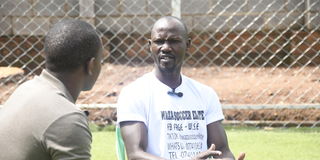
Former Uganda Cranes and Gor Mahia defender Godfrey Walusimbi (right) during the interview with Nation Sport at Kyengera in Kampala on November 15, 2023.
“Sometimes you want to make things quick and direct in order to score but for them they prefer to do their tricks and if you don’t welcome them, you become an enemy. If someone does something which annoys you and you happen to show it, you become an enemy.
“Any player would want to be involved in any action going on the pitch. There were times when we had a tactical move that we wanted to execute that required three or four players but they could intentionally exclude you meaning you could not be seen and just be dormant on the pitch. How are you going to be evaluated for that particular match?” he posed.
Month-long strike at Gor
His time at Chiefs pales in comparison to the five years he spent at Gor Mahia having been lured to the record Kenyan champions by his “football father” Bobby Williamson back in December 2013.
“To be honest, I knew nothing about Gor Mahia but I trusted Bobby. He was like a father to me and one of the best coaches I ever worked with. After doing my research I realized it was one of the best clubs in Kenya so I signed for them,” said Walusimbi, who had worked with Williamson at the Uganda national team for five years.
It didn’t take long for Walusimbi to settle as he quickly established himself as a regular at left back emerging as a fan favourite for the Green Army.
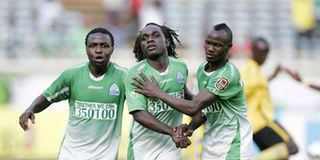
Gor Mahia's Ugandan striker Dan Sserunkuma (centre) leads teammates Collins Okoth (left) and Godfrey Walusimbi in celebrating his goal during a past league match.
“I really enjoyed my time at Gor Mahia and felt at home because of their fans. There was a time I went on strike for almost a month due to payment of my signing fee. I thought the fans would turn against me, but surprisingly, they supported me and demanded that the executive pay me. Eventually, I was paid due to the pressure from the fans,” recalls Walusimbi amid a chuckle.
His impressive resume at Gor featured four league titles, but it’s the 2015 one that they won unbeaten under Frank Nuttall that remains dear to him.
“That season we had a lot of financial issues but the fans kept us going. There is a time they could do shopping for us so we didn’t spend money on basic needs. After two or three months when the supplies were depleted, it’s when we could realise that we hadn’t been paid our salaries and bonuses. We had to organise strikes to demand our pay since that was the only way that the management could act,” revealed Walusimbi, who has a Diploma in Physical Fitness.
Uganda Cranes regular
Peak Walusimbi was also a mainstay at Uganda Cranes and was part of the teams that featured in the 2017 and 2019 Africa Cup of Nations held in Gabon and Egypt respectively. He revels in the rare feat of being the most capped Ugandan player and credits his longevity to a ‘SWOT’ analysis he consistently carried out during his national team career.
“I used to carefully analyse my strengths, weaknesses, opportunities and threats every time I was in the national team. I was tiny but could read the game so well and had good technique. This gave me an edge over those who were bigger in size. Any opportunity that I got, I played like it was my last game; from my debut to my first start until the last match that I played. I also did a lot of strength training to boost my ability to win physical battles on the pitch,” Walusimbi told Nation Sport.
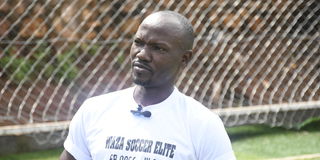
Former Uganda Cranes and Gor Mahia defender Godfrey Walusimbi during the interview with Nation Sport at Kyengera in Kampala on November 15, 2023.
It was put to him that he might have retired early given that some of his former teammates are still active. However, Walusimbi, a CAF C Coaching License holder, insists he quit at the right time.
“My dream was to play alongside players I used to hear about while growing up, the likes of Ibrahim Sekagya, Simeon Masaba and David Obua. I played with all of them on the same pitch which means I achieved my targets. Playing professional football was just a plus for me,” said the father of one daughter, Olivia.
Waza Soccer Elite academy
Now 34, Walusimbi juggles his time between class and his football academy, Waza Soccer Elite, which was inspired by a failed trial at Swedish side BK Hacken back in June 2011.
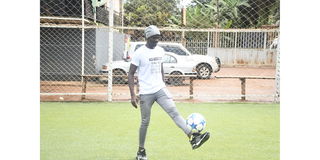
Former Uganda Cranes and Gor Mahia defender Godfrey Walusimbi juggles the ball before the interview with Nation Sport at Kyengera in Kampala on November 15, 2023.
“When I went to BK Hacken, I was bragging that I was big player because I had around 12 to 15 caps. None of my teammates was in the Swedish national team but they were clearly at a higher level than me, meaning my football foundation was not good.
“Our football does not have the right structures that’s why I started this academy to equip our players with the right basics at a young age for them to excel in their careers. I have travelled far and wide and I know what it takes to play at the highest level,” asserted Walusimbi, a second-year student at Ndejje University pursuing a Human Resources Management degree.





